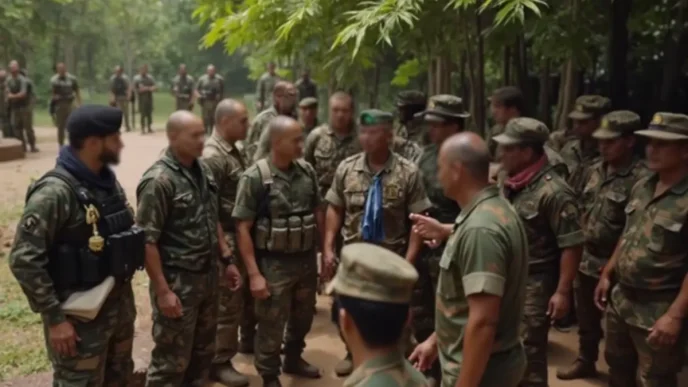Indonesia’s latest National Police regulation on the supervision of foreigners, including journalists, has ignited a firestorm of criticism from media organizations and legal experts, who warn it could undermine press freedom and restrict foreign media coverage in the country. Signed into effect on March 10, 2025, by National Police Chief Gen. Listyo Sigit Prabowo, the policy has raised questions about the balance between national security and democratic principles in the world’s fourth-most populous nation.
Details of the Controversial Regulation
Police Regulation No. 3/2025 outlines procedures for the “functional supervision of foreigners,” citing concerns over security threats, espionage, sabotage, and propaganda against the government. Articles 5 and 9 of the regulation have drawn particular scrutiny, as they stipulate that foreigners conducting journalistic work or research must submit written requests with personal data and obtain an official journalism permit. Critics argue that these provisions add an unnecessary bureaucratic hurdle for foreign journalists, potentially deterring or obstructing their ability to report freely in Indonesia.
National Police Chief Listyo has sought to downplay the concerns, stating on April 7, 2025, that the regulation does not make police clearance mandatory for foreign journalists. “Without clearance from the police, foreign journalists can still carry out their duties as long as they don’t violate applicable laws” he told kompas.com. He further clarified that the police could issue a clearance letter upon request from a guarantor and offer protection to journalists reporting in conflict-prone areas such as Papua. However, his reassurances have done little to quell the unease among press advocates.
Overlapping Laws and Bureaucratic Challenges
Indonesia already has a complex web of laws governing foreign media coverage, including the 1999 Press Law, the 2002 Broadcasting Law, and additional regulations from 2005 and 2009 that require foreign journalists to obtain permission from the Communications and Digital Ministry. A specialized body within the ministry now handles foreign media licensing, while journalists must also secure a 60-day C5 visit visa through a sponsor at the Immigration Office. The new police regulation, critics argue, adds yet another layer of oversight that could exacerbate delays and create opportunities for exploitation by law enforcement.
The Press Council, tasked with overseeing foreign journalists under the Press Law, has condemned the regulation as “an attempt to control and monitor journalistic work” that contradicts higher legal frameworks. Council Chairwoman Ninik Rahayu emphasized that the policy risks violating the principles of a democratic and independent press. Similarly, the Legal Aid Institute for the Press (LBH Pers) described the regulation as “excessive intervention and an overreach of police authority.” Executive Director Mustafa Layong warned that foreign journalists operating without a clearance letter could be deemed illegal, potentially justifying restrictive actions against them.
Broader Implications for Press Freedom
The regulation has intensified existing concerns about press freedom in Indonesia, particularly for foreign journalists who often face challenges when covering sensitive topics such as environmental issues, human rights abuses, and regional conflicts. Historical cases underscore these difficulties. In 2020, US journalist Philip Jacobson, working for the environmental outlet Mongabay, was detained in Central Kalimantan over an alleged visa violation—an incident the Alliance of Independent Journalists (AJI) criticized as an administrative pretext to halt journalistic activities. A 2023 report by Papuan media outlet Jubi also highlighted the increasing difficulty of obtaining journalist visas to cover conflicts in Papua, with AJI noting that at least 56 permit applications were rejected between 2012 and 2015.
Bayu Wardhana, Secretary-General of AJI, called the new regulation a direct restriction on press freedom, which is constitutionally guaranteed in Indonesia. “Foreign journalists can conduct reporting with a journalist visa, which is already difficult to obtain. The additional required clearance from the police further restricts press freedom” he stated. Legal experts have gone further, with Muhammad Isnur of the Indonesian Legal Aid Foundation labeling the policy “a betrayal of the 1945 Constitution and democracy” and a threat to Indonesia’s international credibility. Isnur urged the National Police to annul the regulation and avoid similar policies that undermine good governance and human rights.
Context of Legislative Changes
The police regulation emerges amid broader legislative developments that have alarmed media activists. The House of Representatives is currently deliberating revisions to the 2002 Broadcasting Law, with some draft provisions proposing a ban on investigative reporting by media broadcasters—a move critics say would severely curtail journalistic freedom. Activists have called on lawmakers to drop such provisions. Additionally, a proposed revision to the 2002 Police Law, discussed last year, includes measures that would expand the National Police’s authority in intelligence gathering, including surveillance of foreigners visiting Indonesia. These overlapping initiatives suggest a trend toward tighter control over information and media access in the country.
Public sentiment, as reflected in discussions on platforms like X, indicates growing concern about the erosion of democratic norms. While the government frames these policies as necessary for national security, many Indonesians and international observers worry that they could stifle dissent and limit transparency, particularly in regions like Papua, where independent reporting is already challenging.
Historical Struggles for Media Access
Indonesia’s relationship with press freedom has long been fraught, shaped by its history of authoritarian rule under Suharto’s New Order regime (1966-1998), during which media censorship was rampant. The post-1998 Reformasi era brought significant gains, including the 1999 Press Law, which abolished many restrictions and established the Press Council. However, challenges persist, especially for foreign journalists covering sensitive areas. The eastern province of Papua, for instance, remains a focal point of tension due to ongoing separatist conflicts and allegations of human rights abuses. Foreign media access to the region is often restricted under the guise of security concerns, and the new police regulation could formalize such barriers further.
Media organizations argue that Indonesia’s democratic progress hinges on a free and independent press, which serves as a check on power and a conduit for public accountability. Policies like Regulation No. 3/2025, they contend, risk rolling back hard-won freedoms and aligning Indonesia with more restrictive regimes in the region. The international community, including press freedom watchdogs, is likely to scrutinize these developments closely, as Indonesia seeks to maintain its reputation as a democratic leader in Southeast Asia.
Voices of Protest and Calls for Reform
The backlash against the police regulation coincides with broader public unrest over legislative changes perceived as authoritarian. On March 27, 2025, protesters in Jakarta clashed with police outside the House of Representatives, where a demonstration against revisions to the armed forces law turned violent. Images of water cannons being used to disperse crowds, captured by AFP, underscored the growing tension between the state and civil society. While the protest was unrelated to the press freedom issue, it reflects a wider dissatisfaction with policies seen as curbing democratic rights.
Legal and media advocates are now pressing for a reevaluation of the police regulation, urging authorities to prioritize dialogue with stakeholders over unilateral policymaking. The Press Council and AJI have called for greater transparency in how such regulations are drafted and implemented, warning that without reform, Indonesia risks alienating both its citizens and the global media community. For foreign journalists, the stakes are personal as well as professional—navigating an increasingly complex bureaucratic landscape could deter critical reporting on issues that demand international attention.
Looking Ahead
As Indonesia grapples with these contentious policies, the future of press freedom in the country hangs in a delicate balance. Will the National Police heed calls to annul Regulation No. 3/2025, or will it become a permanent fixture in an already restrictive media environment? With legislative revisions to the Broadcasting and Police Laws still under discussion, the coming months will be critical in determining whether Indonesia can safeguard its democratic credentials or risks sliding toward greater state control over information. For now, journalists—both local and foreign—remain on edge, watching closely as the nation navigates this pivotal moment.














